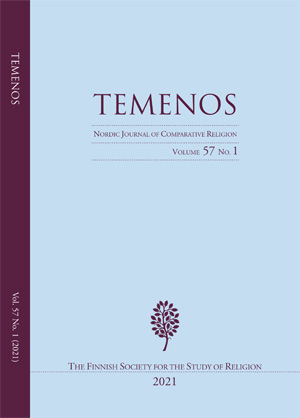Bloody, Intense, and Durable
The Politics of 'Religious Conflict'
DOI:
https://doi.org/10.33356/temenos.95992Keywords:
religious conflict, secular conflicts, identity, conflict issue, critical analysis, neoliberal status quoAbstract
A growing number of scholars argues that we are witnessing a resurgence
of religion in world politics, accompanied by an increase
in religiously inspired conflict. Empirical studies demonstrate that
religious conflicts are more violent, more intense, more durable, and
more difficult to resolve through negotiated settlements than their
secular counterparts. In this paper, we argue that these conclusions
are unreliable, because they fail to provide convincing criteria for
separating religious conflicts from non-religious ones. Our main
concern is with the categorization problem. What characteristics or
factors make a conflict party, conflict issue, or identity religious, and
what characteristics or factors frame a conflict party, conflict issue,
or identity as non-religious? A basic assumption behind much of this
research is the contested idea that religion is a universal phenomenon
embodied in various forms such as Islam and Christianity. The majority
of scholars simply assume a sharp division between religion and
the secular without problematizing or justifying such a distinction. In
this article, we argue that religious conflict is an ideologically charged
concept, and that the study of the religion-conflict nexus reinforces
the neoliberal status quo and current systems of power.

Downloads
Published
How to Cite
Issue
Section
License
Copyright (c) 2021 Tomas Lindgren, Hannes Sonnenschein

This work is licensed under a Creative Commons Attribution 4.0 International License.
Author's Guarantee
- The Author acknowledges that the Work will be publicly accessible on the Internet and that such access will be free of charge for the readers.
- The Author guarantees that the Work is her/his original work that has not been published before and cannot be construed as copying or plagiarism. Furthermore, the Author confirms that the Work contains no statement that is unlawful, defamatory or abusive or in any way infringes the rights of others.
- The Author confirms that she/he has secured all written permissions needed for the reproduction in the Publication of any material created by a third party.
User Rights
Under the CC BY 4.0 license, the Author/s and users are free to:
- Share — copy and redistribute the material in any medium or format,
- Adapt — remix, transform, and build upon the material for any purpose, even commercially,
- However, the Work must be attributed to the original Author and source of publication.
The license of the published metadata is Creative Commons CCO 1.0 Universal (CC0 1.0)
Author Rights
The Authors maintain the right to:
- copyright, and other proprietary rights relating to the Work,
- the right to use the substance of the Work in future own works,
- the right to self-archiving/parallel publishing (publisher's PDF allowed).
Rights of Publisher
- The Publisher reserves the right to make such editorial changes as may be necessary to make the Work suitable for publication in the publication, e.g. style of punctuation, spelling, headings and the like.
- The Publisher will publish the Work if the editorial process is successfully completed and reserves the right not to proceed with publication for whatever reason.
- The publication entitles the author to no royalties or other fees. This agreement will be governed by the laws of Finland.






